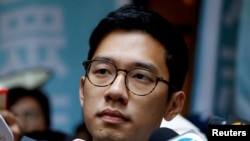Exiled Hong Kong democracy activists say an intensified new campaign authorities launched this month to silence those overseas could have a chilling effect going forward. It is also forcing those in exile, they say, to consider additional precautions as security risks increase for themselves and their families still in Hong Kong.
A little more than a week ago, Hong Kong authorities issued arrest warrants and offered a bounty of 1 million Hong Kong dollars – about $128,000 – apiece for eight prominent activists overseas. After that, four men in Hong Kong were arrested and accused of providing those in exile with support.
And then on Tuesday, national security police raided exiled activist Nathan Law’s family home in Hong Kong and took away his parents and older brother for questioning. They were later released.
A Hong Kong Police Force spokesperson told VOA that Law’s parents and brother were suspected of “assisting persons wanted by police to engage in activities that endanger national security.” The spokesperson also said an investigation is underway and added that further operations, including arrests, may be made.
Law has denied that his family provided him with financial support.
Family ties
Although the eight who have bounties on their heads are in the United States, Australia and Britain, which do not have extradition treaties with Hong Kong, the moves have clearly raised the stakes.
Nathan Law has told the BBC that his life has now become more dangerous.
Alex Chow, a prominent Hong Kong activist and board chair of the Washington-based nonprofit organization Hong Kong Democracy Council told VOA that the new approach “could extend intimidation to people who have nothing to do with the advocacy work done by overseas activists.”
Chow added that Hong Kongers now need to consider some precautions to try to protect loved ones who are still in Hong Kong.
“This is a tough situation for activists abroad because their family members could be used by Hong Kong authorities to pressure them,” he said.
Given the bounties and arrest warrants, some overseas Hong Kongers have even begun to contemplate whether it is still safe for them to engage in activism.
“The diaspora community may feel some pressure and choose not to attend pro-democracy protests abroad,” said Michael Mo, a former district councilor in Hong Kong who now resides in the U.K.
Secure activism
Others are already looking for ways to continue to be a part of Hong Kong’s pro-democracy movement and make sure that their participation in activism is more secure.
“I know a lot of groups are exploring different ways by adopting secure precautions, both digital and physical,” said Maya Wang, the associate Asia director for Human Rights Watch. She added that compared to other diaspora communities, Hong Kong people are already more adept at taking precautions to ensure their security.
Former District Councilor Michael Mo told VOA that one thing some organizers of demonstrations can do is to try to get as many volunteers as they can to help identify whether there are suspicious individuals or too many cameras nearby when protests are held overseas.
“Volunteers need to be prepared for any kind of intimidation and if they think things are not right at the scene, they should inform organizers immediately,” he said.
To offer participants enough protection, organizers sometimes hand out masks so activists can avoid being photographed by unknown strangers, Mo added.
Other measures that Mo said he thinks overseas activists could adopt include always participating in events as a group and trying to avoid publicly announcing plans to attend events ahead of time.
“Some activists only share information or photos of events that they’ve joined afterward because it minimizes the chance of alerting pro-China individuals or anyone who might want to follow their whereabouts,” he told VOA.
Digital threats
Chung Ching Kwong, the Hong Kong campaigns coordinator for the Inter-Parliamentary Alliance on China, said that since a lot of threats that overseas Hong Kongers may face are connected to their technology, they should use different tools, including end-to-end encryption and password security to protect themselves and those they are in contact with.
“I see efforts from the diaspora community to educate each other about the importance of digital security, but not enough works have been done and there aren’t enough resources and people with enough know-how to share their knowledge,” Kwong added.
Host government support
Some experts think foreign governments also have a role to play to ensure Hong Kong diaspora communities’ freedom of speech and freedom of assembly will continue to be protected.
“If the host governments can’t assure protection of these basic rights, the diaspora community may still think they can be intimidated by Hong Kong authorities, especially if they still have family members back there,” said Eric Lai, a visiting researcher at the Dickson Poon School of Law at King’s College in London.
Over the past year,there have been several cases of Chinese nationals assaulting Hong Kong activists that live in the U.K. In June, British police began an investigation after video footage showing pro-Hong Kong demonstrators attacked by a group of Chinese nationals in Southampton.
Last October, a Hong Kong protester was attacked on the grounds of the Chinese Consulate in Manchester. The incident pushed British police to launch an investigation and resulted in Bejing removing six Chinese diplomats who were allegedly involved in the assault from the U.K.
Kwong says that more training, education, or information should be provided to frontline civil servants in countries that host large Hong Kong diaspora communities because it will help them understand the severity of the problem facing overseas Hong Kongers, and in turn, they may develop a better understanding about what they can do as well.








